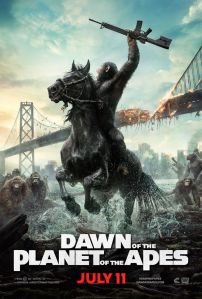Dawn of the Planet of the Apes is better than it has a right to be. The premise, if you are familiar with the series, is the stuff of hallucinogenic extravagance. Apes talk. Apes ride horses. They brandish firearms. Mayhem ensues–and how could it not? They’re apes! Culture and community happen. Pierre Boulle, the Frenchman who wrote the novel Planet of the Apes, the source material for the iconic film of the same name, must have been an interesting fellow.
But I digress. Dawn is a sequel to Rise of the Planet of the Apes, a surprise hit from 2011. Rise sets up the events that come to fruition in Dawn. A pharmaceutical company creates a drug designed to treat Alzheimer’s, but the apes they test it on become quite intelligent. One of those, Caesar, is raised in a human household and learns to communicate through both sign language and, eventually, speech. While this is potentially problematic, what empowers the apes destroys humans, eventually leveling most of humanity via the Simian Flu.
Dawn takes place a decade later and revolves around the emerging ape community constructed by Caesar and hundreds of his cohorts, and its eventual contact, and conflict, with a colony of surviving humans. Caesar’s world is full of human residue. There is a school. Sentries guard the perimeter. Hunts are organized and cleverly executed. There are apes dedicated to birth and sickness. Politically, the regime is top-down, built around the smartest ape, Caesar, and the loyalty he has earned. His only rival is Koba, a monkey who was experimented on and “tortured” by humans in a lab.
Caesar’s shrewdness runs into a small band of humans and the contact begins a series of interactions that, unsurprisingly, escalate out of either side’s control. The humans are led by Dreyfus (Gary Oldman), Malcolm (Jason Clarke), and Ellie (Keri Russell). They need fuel to power their colony and Caesar wishes to aid them, while Koba counsels war. They mirror the interactions of Dreyfus, who is ready for conflict, and Malcolm, who works to avoid it. From this beginning, the film unspools majestically.
The most remarkable thing about Dawn is that the portrayal of the ape community looks and feels natural. The special effects are seamless. They were so good that I almost never considered I was watching anything beyond a group of apes and not a gaggle of human actors wearing sensors. We have come a long way since Roddy McDowall pranced around the original set in a costume that most toddlers would refuse to wear today. Andy Serkis, the human actor behind Caesar, is a master. He played Gollum in The Lord of the Rings Trilogy, as well as King Kong in…wait for it…King Kong. I do not know how much of what you see on the screen is Serkis (facial expressions?) and how much is c.g.i., and, in the end, I do not care. The result is brilliant.
There are moments that border on artistry. At one point, Koba mounts a tank and as the turret spins, the camera follows him. Within seconds, a 360 degree view reveals the carnage that surrounds him and the anger that inflames him. Caesar, proud of the trust he has placed in the humans, shows them the fruits of their labor as lights twinkle in the distance. Caesar reacts to his newborn son and his laboring wife, and he does so with expressions that everyone will recognize. The apes, throughout the film, not only are presumed to have human qualities, but they show emotions and attitudes that range from courage to jealousy and from fondness to rage. It is captivating. Perhaps in two decades I will look back and wince at my technological naivete, but I hope not.
Dawn‘s theme is elegant yet simple. Though the film is about apes (on horses! with guns!) and humans and the natural barriers that exist between them, this conflict is a façade for human relations of all sorts. The film is about how the groups we belong to–be they racial, economic, geographic, political, or religious–naturally isolate us from others. If you get outside of your bubble, you will find the good and the bad both inside and outside your parochial attachments. Caesar begins the story with complete trust in his fellow apes, convinced they are superior to their human counterparts. As the story progresses, Caesar realizes, after human contact shuffles the loyalties that surround him, that “human” nature is universal, even for apes.
Final Grade: 3/3 Eggheads.

 Bert Wheeler
Bert Wheeler
 Jeff Haymond
Jeff Haymond
 Marc Clauson
Marc Clauson
 Mark Caleb Smith
Mark Caleb Smith
 Tom Mach
Tom Mach